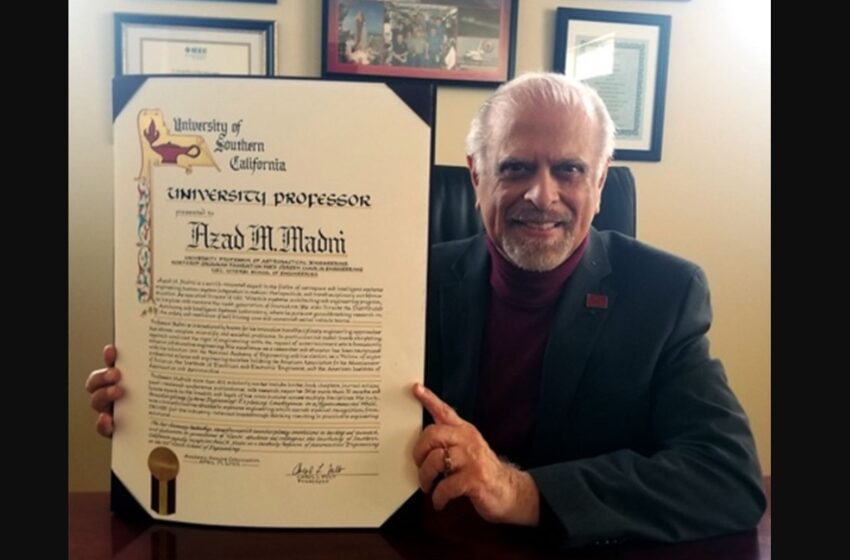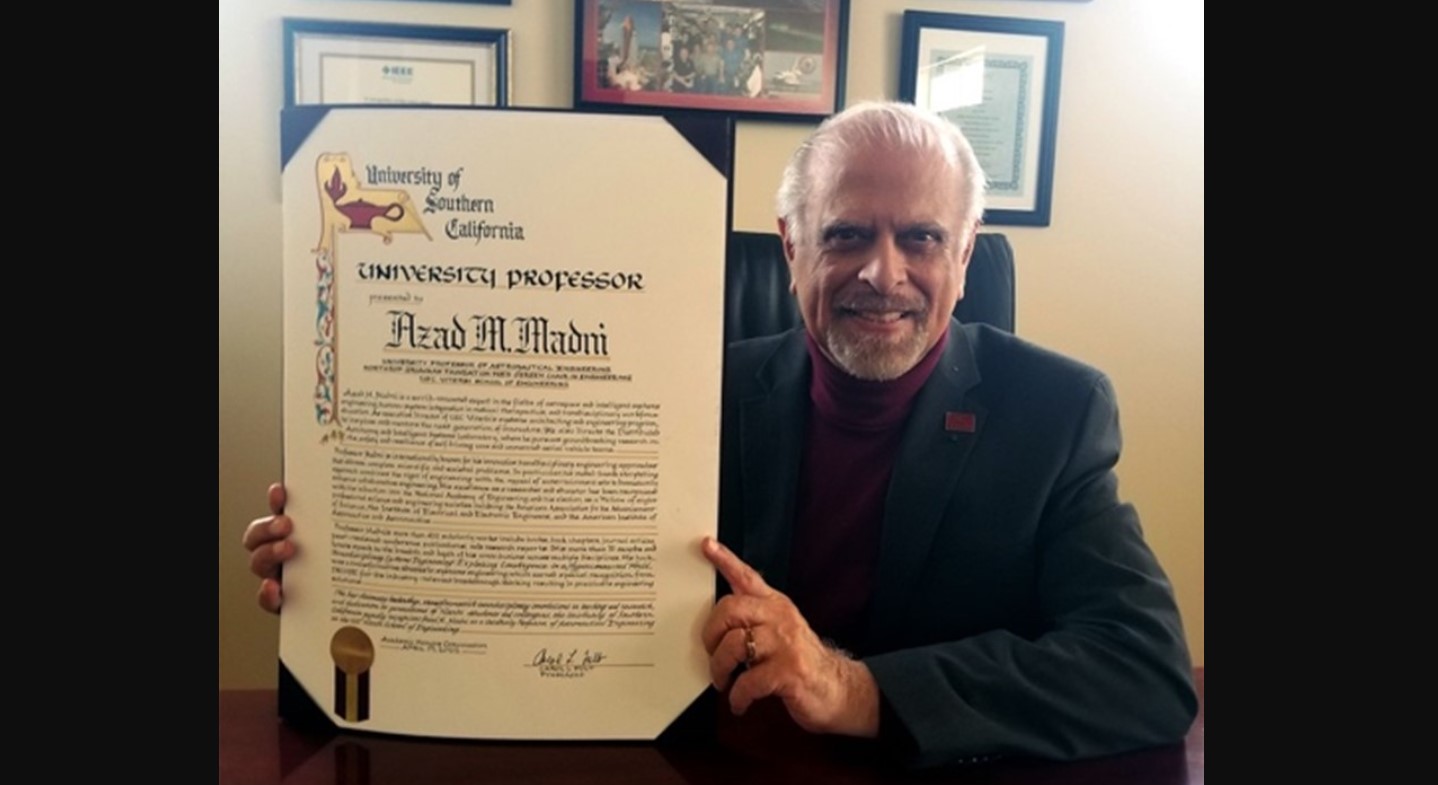Indian American professor prepares engineers for tomorrow

 Dr. Azad M. Madni’s innovative work wins him the $500,000 “Nobel Prize of Engineering Education”
Dr. Azad M. Madni’s innovative work wins him the $500,000 “Nobel Prize of Engineering Education”
An Indian American professor’s efforts to ensure “that engineers are prepared for tomorrow—and whatever tomorrow brings,” have won him the National Academy of Engineering’s 2023 Bernard M. Gordon Prize, described as the “Nobel Prize of Engineering Education.”
Dr. Azad M. Madni of University of Southern California (USC) was recently awarded the $500,000 prize which recognizes new modalities and experiments in education that develop effective engineering leaders.
Read: C.R. Rao awarded 2023 International Prize in Statistics (April 10, 2023)
Half of the cash prize is granted to the recipient and the remainder granted to their institution to support the continued development, refinement, and dissemination of the recognized innovation.
Madni was recognized for creating and disseminating a transdisciplinary systems engineering education paradigm based on entrepreneurial leadership, innovation, convergence, social awareness, and diverse thinking and backgrounds.
“The importance—and value—of producing systems engineers with interdisciplinary skills and an innovation mindset cannot be overstated,” said Dr. John L. Anderson, president of the NAE.
“Engineering is a global effort. To be effective, future engineers must bring to the table myriad skills and diversity of thought to successfully address the challenges of inevitable surprises, such as natural disasters and pandemics, and help alleviate the risk of unintended consequences.”
“Azad Madni’s efforts are a major step forward in ensuring that engineers are prepared for tomorrow—and whatever tomorrow brings,” Anderson added.
Madni defined the field of transdisciplinary systems engineering and is the creator of transdisciplinary systems engineering education (TRASEE™), which fosters out-of-the-box thinking while enhancing retention and recall of concepts and facts through innovative storytelling and role-playing approaches.
Through TRASEE, Madni transformed USC’s Systems Architecting and Engineering Program by incorporating content from complementary disciplines in the curriculum and also redefined the teaching approach by combining storytelling with pedagogical principles from the learning sciences.
Intended to produce systems engineers with interdisciplinary skills and an innovation mindset, TRASEE integrates convergence, innovation, entrepreneurial leadership, social and cultural awareness, and diversity of thought and backgrounds in the engineering curriculum.
It invokes problem-solving skills through team role-play exercises and fosters the innovation and testing of ideas with peers from diverse backgrounds under imperfect conditions in real time.
“Azad’s pioneering work in the field of transdisciplinary systems engineering exemplifies the purpose of the Bernard M. Gordon Prize for Innovation in Engineering and Technology Education, which recognizes individuals for innovations such as curricular design, teaching methods, and technology-enabled learning that strengthen students’ capabilities and desire to grow into leadership roles,” Anderson said.
At USC, Madni is University Professor and holder of the Northrop Grumman Foundation Fred O’Green Chair in Engineering in the Viterbi School of Engineering, executive director of the Systems Architecting and Engineering Program, founding director of the Distributed Autonomy and Intelligent Systems Laboratory, and faculty affiliate of the USC Ginsburg Institute for Biomedical Therapeutics.
He is also founder and CEO of Intelligent Systems Technology, Inc, a high-tech R&D company specializing in transdisciplinary model-based approaches to scientific and societal problems of national and global significance.
In addition, Madni is chief systems engineering advisor to Aerospace Corporation and a former Distinguished Visiting Fellow at NASA’s Jet Propulsion Laboratory Space Microelectronics Center.
His key areas of research include transdisciplinary and model-based systems engineering methods for realizing intelligent cyber-physical-human systems (such as autonomous vehicles, smart manufacturing, and outcome-driven health care), interactive storytelling in virtual worlds, and augmented intelligence in adaptive human-machine teaming.
Elected to the NAE in 2021, Madni also is a fellow of ten professional science and engineering societies, including AAAS, IEEE, AIAA, INCOSE, and IISE.
He is the recipient of the most prestigious awards and honors from IEEE, AIAA, INCOSE, ASME, IISE, ASEE, SDPS, and SCS. Most recently, he was honored by IEEE with the 2023 Simon Ramo Medal for exceptional achievements in systems engineering and system science.
He was awarded the Pioneer Award from IEEE AESS in 2019 and from INCOSE in 2011. In 2021, he received the INCOSE Benefactor Award for his philanthropy and mentorship of engineering students and junior engineers from under-served populations worldwide.
Read: Azad Madni Receives NAE’s 2023 Gordon Prize (January 5, 2023)
This was only the second time in its 31-year history that INCOSE made this award. Madni earned his bachelor’s, master’s, and doctoral degrees in engineering from the University of California, Los Angeles, and is a graduate of AEA/Stanford Executive Institute.
Founded in 1964, the US National Academy of Engineering is a private, independent, nonprofit institution that provides engineering leadership in service to the nation.
Its mission is to advance the welfare and prosperity of the nation by providing independent advice on matters involving engineering and technology, and by promoting a vibrant engineering profession and public appreciation of engineering.

